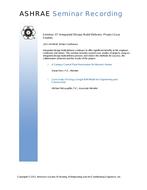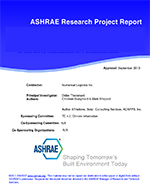Buildings account for about 50% of the greenhouse gas production and use about 40% of the energy consumed in the U.S. and Canada . Approximately 25% of this consumption can be attributed to windows. Good thermal design offers many possibilities for reduced energy consumption, peak load reduction, downsized equipment and increased comfort. Clearly, the potential for saving energy in this sector is enormous.
The purpose of this project is to enable the straightforward and practical energy analysis of buildings that incorporate window shading attachments. This objective will be achieved with the following broad steps:
- Model development and validation. A comprehensive fenestration model, designated ASHWAT (ASHRAE Window Attachment models), will be assembled … based on a combination of existing procedures and new work. It will be validated using existing and new experimental data.
- Reference implementation. ASHWAT will be fully implemented within the Heat Balance and Radiant Time Series formulations found in the ASHRAE Toolkit.
- Documentation and application guidelines. The models will be fully documented, including equation form. Application guidelines will specify input requirements and methods for estimating inputs that are not completely known. Tabular results for common systems will also be prepared by applying ASHWAT ( a set of FORTRAN subroutines that models multi-layer complex fenestration systems ) to typical configurations.
Note: Zip file is 38 MB
Units: SI
Product Details
- Published:
- 2009
- Number of Pages:
- 510
- File Size:
- 1 file , 36 MB
- Product Code(s):
- D-RP-1311


